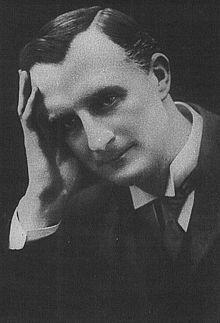But I Never Saw Him Again in My Lifetime

"The lamps are going out all over Europe, we shall not see them lit once again in our life-time", British Foreign Secretary Sir Edward Greyness remarked to a friend on the eve of the Britain's entry into the First Earth State of war. Get-go published in Grey'south memoirs in 1925, the statement earned wide attention as an authentic perception of the First World War and its geopolitical and cultural consequences.
Original sources [edit]
Grey's memoirs Twenty-Five Years 1892–1916 mention the remark as being fabricated on 3 August 1914:
A friend came to see me on one of the evenings of the last week — he thinks it was on Monday, August 3rd. We were standing at a window of my room in the Foreign Office. Information technology was getting dusk, and the lamps were being lit in the infinite below on which we were looking. My friend recalls that I remarked on this with the words: "The lamps are going out all over Europe, we shall not see them lit once more in our life-fourth dimension."[1]
In 1927, John Alfred Spender, editor of the Westminster Gazette until 1922, identified himself as the friend to whom Grey had spoken:
I had two short talks with Grey during the "twelve days."[2] I ran into him on the stairs of the Foreign Office on Saturday, August 1st [...] I saw him once more belatedly in the evening at his room at the Strange Office on Monday, August 3rd, and it was to me he used the words which he has repeated in his book, "The lamps are going out all over Europe, and we shall not come across them lit once more in our lifetime." Nosotros were standing together at the window looking out into the dusk beyond St. James's Park, and the appearance of the first lights forth the Mall suggested the thought.[iii]
Later allusions [edit]
Gray'southward quotation has been used as a summation of the state of war in numerous historical works. The German author Ludwig Reiners (1896–1957) published an business relationship of Globe War I entitled The lamps went out in Europe. Therein Grey's comment is followed by the assertion attributed to Otto von Bismarck: "The mistakes that have been committed in foreign policy are not, as a rule, apparent to the public until a generation afterwards."[four] Samuel Hynes began his 1990 A State of war Imagined with a paragraph roofing the quotation, referring to it as the best-known and near often quoted response to the beginning of the war.[5] In 2014 Grayness'due south words were the inspiration for part of the British celebration of the centenary of the outbreak of the Start World War. Between 10 and 11 pm on 4 August 2014, lights were dimmed at many public locations and in private homes, including progressively at a national memorial service in Westminster Abbey.[six]
On 16 October 1938, Winston Churchill circulate a speech known every bit "The Defence of Liberty and Peace (The Lights are Going Out)" to London and the United States. In the speech he says, "The stations of uncensored expression are endmost down; the lights are going out; but there is still time for those to whom freedom and parliamentary authorities mean something, to consult together."[7]
Notes [edit]
- ^ Viscount Grey of Fallodon: Twenty-V Years 1892–1916 (New York, 1925) p. xx books.google.
- ^ Headlam, James Wycliffe (1915). "The history of twelve days, July 24th to Baronial 4th, 1914: existence an account of the negotiations preceding the outbreak of war based on the official publications". London: T. F. Unwin, Ltd. – via Net Archive.
- ^ J.A. Spender, "Life, Journalism and Politics", Vol. 2. Frederick A. Stokes Visitor, New York 1927. Chapter 20, p. fourteen-fifteen archive.org
- ^ Reiners, L. The lamps went out in Europe, (London, 1955), p. v books.google. Translated from the German by Richard and Clara Winston. In Europa gehen die Lichter aus. Der Untergang des Wilhelminischen Reiches. Munich 1954.
Bismarck's memoirs contain the post-obit: "Apropos the blunders which had been fabricated in our strange policy public opinion is, every bit a rule, first enlightened when it is in a position to look back upon the history of a generation, and the Achivi qui plectuntur are not ever immediately contemporary with the mistaken deportment." The Kaiser vs. Bismarck. Suppressed Letters by the Kaiser and New Chapters from the Autobiography of the Iron Chancellor. Translated by Bernard Miall. Harper New York & London 1921, p. 183 annal.org
"Ueber die Fehler, welche in der auswärtigen Politik begangen wurden, wird sich die öffentliche Meinung in der Regel erst klar, wenn sie auf die Geschichte eines Menschenalters zurückzublicken im Stande ist, und die Achivi qui plectuntur sind nicht immer die unmittelbaren Zeitgenossen der fehlerhaften Handlungen." Otto von Bismarck: Gedanken und Erinnerungen chapter 12 zeno.org
Achivi qui plectuntur refers to the proverbial verse "Quidquid delirant reges, plectuntur Achivi" from Horace's Epistles Liber I Epistula II la.wikisource; "Whatever folly the kings commit, the Achaeans pay the penalty." Translation Henry Rushton Fairclough, Loeb Classical Library, 1926. - ^ Hynes, S. A War Imagined, The First Earth War and English Culture, (London, 1990) p. three books.google.
- ^ The Times, five August 2014 and other newspapers
- ^ Churchill, Winston. "The Defence force of Freedom and Peace (The Lights are Going Out)". The International Churchill Society. Retrieved 7 March 2017.
External links [edit]
- Foreign News: The Lights Go On from TIME Magazine
Source: https://en.wikipedia.org/wiki/The_lamps_are_going_out
0 Response to "But I Never Saw Him Again in My Lifetime"
Post a Comment